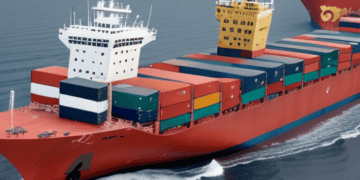In a recent editorial, Alexis Mizell-Pleasant, a managing editor with a keen insight into supply chain dynamics, engaged in a comprehensive discussion with industry specialists on the emerging challenges within the global supply chain sector. The focus was on the profound impact of maritime security concerns on both the economy and the logistics of shipping.
The article delves into the increasing incidences of maritime disruptions, particularly highlighting the situation in the Red Sea. The region, plagued by escalating regional conflicts, notably involving Houthi rebels targeting commercial vessels, has been aptly termed the ‘Red Sea Crisis’. This situation has sparked a call for immediate international response and diplomacy to safeguard both the economic interests and the safety of maritime operators.
In response to these threats, a significant shift in maritime logistics has been observed. Major shipping corporations are altering their routes, opting for longer journeys via the South African Cape of Good Hope instead of the more direct Suez Canal path. This change is resulting in extended travel times, contributing to a domino effect of delays and increased operational costs. These factors are aggravating the already prevalent issues of global inflation.
Matthew Burgess, Vice President of Global Ocean Services at C.H. Robinson, sheds light on the broader implications of these disruptions. He notes that the strain is not limited to the Red Sea but is felt globally, especially in the Asia-Europe trade lane. Burgess emphasizes the necessity for shippers to book ocean freight well in advance, suggesting a 3-4 week lead time. He also touches on the growing problem of container shortages in Asia, a direct consequence of prolonged transit times, and suggests considering less-than-container load (LCL) shipping as a viable alternative under these circumstances.
Safety concerns for cargo shippers are paramount, with recent advisories from the U.S. Department of Transportation’s Maritime Administration underscoring the gravity of the situation. Tony Pelli, Practice Director of Security & Resilience at BSI, advises heightened vigilance for vessels operating in the vicinity of Yemen and Somalia and recommends evaluating alternative routes as a precautionary measure. These changes, however, come with increased insurance premiums, further elevating transportation costs.
Gautam Jain, CEO at GoComet, advocates for the integration of digital technologies in supply chain management. He posits that data-driven strategies and real-time information are critical in navigating these challenges effectively. Jain’s perspective underscores the evolving nature of supply chain management in a digitally interconnected world.
The article also explores the cascading effects of these disruptions on the supply chain, likening the current situation to the upheavals experienced during the COVID pandemic. Burgess points out that many shippers are adopting a survivalist approach, prioritizing the movement of freight by any available means. He suggests a variety of contingency plans, including traditional air freight, sea-air solutions, and expedited inland services.
The conclusion drawn in the article is a call for strategic planning and the adoption of flexible, informed approaches to manage movement through these high-risk areas. Emphasizing the importance of ‘Plan B’ strategies, the article suggests that shippers should consider all available modes of transportation and leverage technology and data to enhance visibility and decision-making processes.















